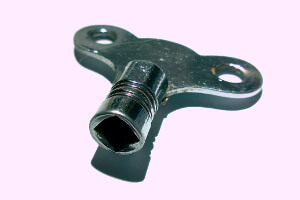 Do you find that your radiators are not heating up properly? Or that one half is hot while the other is cold? It could be that you need to bleed them. It is a common occurrence with heating systems and not one that should alarm you as it is straightforward enough to do yourself. Here is our guide to what bleeding your radiators is all about and how to go about doing it.
Do you find that your radiators are not heating up properly? Or that one half is hot while the other is cold? It could be that you need to bleed them. It is a common occurrence with heating systems and not one that should alarm you as it is straightforward enough to do yourself. Here is our guide to what bleeding your radiators is all about and how to go about doing it.
What exactly does bleeding a radiator do?
Your heating works by circulating hot water through the system and into each radiator, warming it up enough to heat the air around it. Over time, air can make its way into that loop system and when it does it takes up space in your radiator, preventing water from being able to circulate through it properly. When you bleed a radiator, you remove that excess air allowing the water to move through freely again.
How do I know if I need to bleed my radiators?
You will notice that your room isn’t as warm as it used to be even when the heating is on at full blast. If the bottom half of the radiator is warm but the top half is cooler or cold, then you need to bleed it to remove the air. If the top is warm but the bottom is cold then you could have sludge build-up in your system – our previous article tells you more about this and how to deal with it.
My radiator needs bleeding, how do I do that?
You have established that air in your system is the culprit, so this is what you need to do next:
- Turn on your heating and wait for all radiators to warm up. Check them all to see which one(s) is/are affected – it could just be one or it could be a number of them.
- Once you have done that, turn the heating off and give the radiators a chance to cool down. You want to work on them while the water inside them is cooler to avoid any accidents.
- You will need the radiator key, or if you don’t have that, a flat-head screwdriver should do the job. You also need a cloth or rag to catch any water that may escape.
- For each radiator in turn, insert the key or screwdriver and gently turn anti-clockwise, keeping your cloth underneath to protect your floor from any water that may come out.
- You should hear a hissing sound. This is what you want – it is the sound of the air escaping from the radiator.
- This will start to lessen so listen carefully, ready to turn the key clockwise again and close off the system. You could end up with a few drops of water following all that air – this means that the air is now all out. If your system is more modern the water could be under greater pressure so be ready to close the valve quickly.
- Don’t overtighten the valve as you could end up damaging it.
- Once you have finished bleeding all the affected radiators, you need to check your boiler pressure. If it is too low you may need to top it up; your boiler manual will tell you how to do this.
- Now turn your heating back on to make sure that you’ve got all the air out of the system. It could be that you need to repeat the process before it is all out.
For help with your heating system or boiler or for any questions and advice don’t hesitate to give our engineers at Platinum Plumbers a call. You can get hold of us on the phone by calling 020 8855 0361 or by writing to us at .

